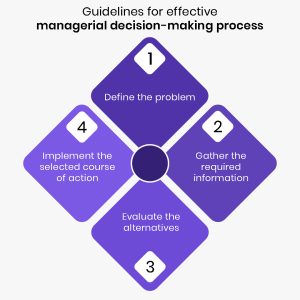
Managerial decision making has a far-reaching impact on the organization. Managers must take ownership of their decisions and ensure that the decisions align with the overall organizational objectives.
In any organization, decision-making is primarily a managerial task. Hence, it is essential to increase awareness among managers regarding the significance of the decisions they take on a daily basis.
Decision-making refers to making a choice among the given alternatives in response to a problem or an opportunity. Every day managers make manifold decisions for motivating their team and achieving pre-defined goals. They shoulder the responsibility of taking different decisions related to aspects such as administration, budgeting, conflict management, or other personal issues of the employees.
Managerial decision making is a crucial determinant of an organization’s success. High-performance of an organization depends on quick and decisive decision-making by managers who use reliable information to tackle decisions and voice their opinions constructively. Each decision should be made based on the right information and unbiased judgment. Otherwise, decisions could lead to unwelcome outcomes for the organization. Effective managerial decision making is integral to the success of not only just the manager but also the team and the entire organization.
A key element behind successful decision-making by managers is their awareness of the impact of their decisions. They must take ownership of their decisions and ensure that they consider all the implications of action from all angles before arriving at a decision. Prior to implementing a decision, they must get the consensus of the entire team and also get the buy-in from the stakeholders.
Decision-making should also be considered from an inter-departmental perspective. The various departments in an organization are intertwined, and the action of each department has a huge impact on other departments and the entire organization. So, we need each manager to think beyond the interests of his individual department. Each manager must identify himself as a critical person who has the potential to take the organization to the next level. Their maturity to think for the organization as a whole before making any decision would ensure that all departments are in sync with each other. This aligns the workflow of each department to the overall organizational benefit.
Manager’s role as a decision-maker

As a decision-maker, the manager is involved in taking multiple types of decisions. They take decisions on routine day-to-day activities, strategic investment decisions, and even emergency decisions to deal with unexpected crises.
Managers act as entrepreneurs while they search for new opportunities for the organization and take vital decisions in implementing a new process or technology. When unexpected events or crisis occurs in an organization, the manager acts as a disturbance handler and takes quick decisions to mitigate the impact of the crisis while ensuring that the organization functions without interruptions.
When we consider the routine decision-making in an organization, the managers play the role of a resource allocator who decides on the right allocation of the financial, human, technological, and other resources in the organization. They also take crucial decisions on approving the funds for purchasing the required resources.
Managers are also an integral part of the negotiation process in the organization. They participate in various negotiations with the stakeholders and represent the organization at various negotiation processes. In case of internal conflicts, the managers take the right decisions to resolve the conflict smoothly.
Guidelines for effective managerial decision making process
Managers can make good decisions only if they follow a structured methodology in the process. Here are a few simple steps the managers must adhere to while making everyday decisions.

- Define the problem – Before taking any decision, the first step is to have a clear understanding of the problem. At this stage, it is mandatory to establish the context of the issue and set goals for resolving it. This procedure will give you a clear picture of the subject matter surrounding which the decision must be taken. Once you get a grasp of the problem, assess its relevance and decide if there is any need to take any action on it. Do not waste time and resources on insignificant issues.
- Gather the required information – During this phase, you determine what information is relevant to the issue. Decisions cannot be subjective and should be based on reliable information. Gather data through brainstorming, research, or experimentation. Other departments and the stakeholders who would be affected by the decision must also be consulted. The collected data has to be evaluated for its positive or negative impact without any bias. Avoid any kind of cognitive bias at this stage, since this might affect the quality of information.
- Evaluate the alternatives – Every problem has several courses of action to resolve it. This stage requires a careful analysis of each alternative, along with the advantages and disadvantages of implementing them. The cost-benefit, and impact of the alternatives are compared before selecting the best solution. The right course of action has to be the one that gives optimum results by making the best use of the resources.
- Implement the selected course of action – Once you have selected a course of action, the next step is to implement it. You have made the decision and now you need to ensure that it meets the desired objectives. While implementing the decision, you must constantly monitor the progress and make the required adjustments to ensure that it delivers the planned results.
Final thoughts
A successful manager is one who takes the responsibility of a leader and accepts ownership of his decisions. Right decisions can improve the morale of the employees and smoothly resolve the diverse issues faced by the organization. Before making any decision a manager has to weigh its merits and demerits and also assess the impact it could have on other departments.
The process of effective decision-making is not easy. The above tips would help you to streamline your decision-making and ensure that every decision you take aligns with the organizational objectives and brings benefits for all.
Follow me on LinkedIn
FAQ
What are the economic factors that influence managerial decision-making?
Pricing conditions, demand forecasting, and cost estimation are the economic factors that influence managerial decision-making.
Why is managerial decision important?
Effective managerial decision-making can support the quick resolution of challenges and lead to organizational success.
What is the scope of decision-making in management?
The scope of decision-making extends to gathering relevant information and assessing alternative options to a problem.



